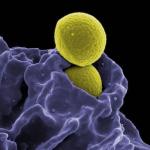The study by Agepha Pharma used by the FDA in its approval of this new indication for use ultimately involved 5478 patients between the ages of 35 and 82 with evidence of coronary artery disease upon imaging [1] and had been clinically stable for
anti-inflammatory drugs
Why do microbes kill some people but not others? This is the hardest question in all of medical microbiology. The reason it's so hard is because the answer depends not just on the microbe in question but also on the person.
Dr. Wallace, thank you so much for agreeing to answer some questions that arose from my article Pain Relief And No Ulcers?







